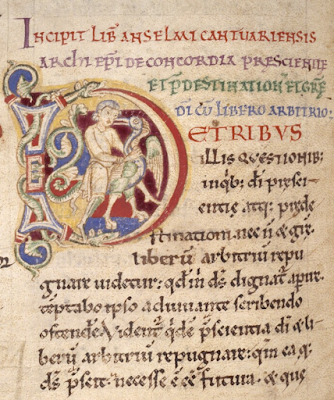Weekly Update 1
 |
| "Where Sinks the Voice of Music into Silence" Ancell Stronach, 1924 |
Anselm probably never met a
professed atheist. He knew non-Christians, certainly: formidable objections to
the Christian account of redemption raised by some learned Jews recently
arrived in London were a key impetus to his treatise on the Atonement (Cur Deus Homo, 1094–1098). But complete
unbelief was something he knew as a possibility only from Scripture: “The Fool
has said in his heart, ‘There is no God.’” Yet he took seriously the challenge of
proving that there is a God, and that God is what Christians believe he is.
Why?
It was not because unbelief was a
live option, for him or for anyone he knew, but because he longed to understand
what he believed. We owe to Anselm the phrase “faith seeking understanding,”
which was the original title of the Proslogion,
in which he set forth his most famous argument for the existence of God. We
entirely miss the point of faith seeking understanding if we think of it purely
as a matter of intellectual restlessness: I believe x, but I won’t feel
as though my belief in x is intellectually respectable until I can offer
a proof that x is true. The enterprise is at least as much a matter of
love as it is of knowledge. I love the truth, and in faith I glimpse it, but
only partially, fleetingly. I want to rest in it, luxuriate in it, possess it
fully instead of merely yearning for it.
Anselm’s arguments for the existence
of God are efforts to possess the truth of God’s existence and nature as fully
as possible. They begin with faith, in the sense that the motivation for
engaging in the arguments is the lively desire to know in full what at first
one only glimpses in part. But the arguments are meant to be persuasive, at least
in principle, even to the unbeliever: for if I cannot put the existence and
nature of God beyond the range of all scruple and doubt, how can I rest in it
as something fully known?



Comments
Post a Comment